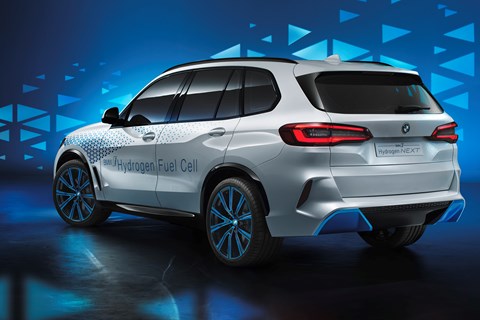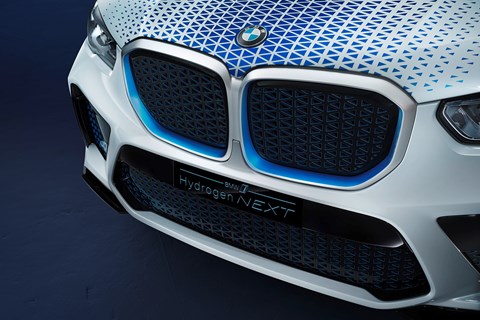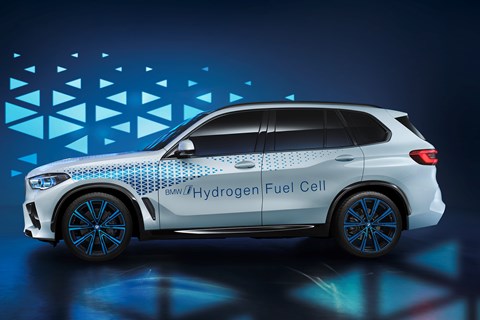► Hydrogen-powered X5
► Planned for small-scale production in 2022
► BMW/Toyota partnership shares FCEV tech
This is not a BMW X5, though it may look virtually identical to one. No, this is the BMW i Hydrogen Next – far from a slick name, but an intriguing idea nonetheless. It made its debut on the BMW stand at the 2019 Frankfurt motor show.
It’s the first product of BMW’s partnership with Toyota, and sees the two brands sharing development of hydrogen fuel-cell technology – widely seen as a possible propulsion system of the future, and one which sidesteps many of the difficulties involved with pure electric vehicles.
Sure looks like an X5…
That’s because it’s based on one. Basing the i Hydrogen Next on a production car shows BMW’s clear intentions to put something akin to this into series production – and it is in fact planning a small production run of these vehicles as early as 2022.

You could even argue that the conversion’s a bit lazy, amounting only to blue accents across the paintwork, alloy wheels and grille and some particularly clunky blanking plates for where the exhaust would exit on a conventional X5.
That’s likely a deliberate move by BMW to make hydrogen tech appear more accessible, though the brand claims that it’s ‘deliberately recognisable as a BMW i model’.
Why hydrogen?
BMW says it’s ‘working on the assumption that, in future, various alternative types of drive system will exist alongside one another’. That’s a long-winded way of saying that the company doesn’t wish to put all of its eggs into one basket, and that it doesn’t want to waste billions in R&D costs on one form of propulsion and then be left behind when the industry moves on.

Back in 2013 BMW teamed up with Toyota, which produces one of the only fuel cell vehicles to ever reach series production. The Mirai has gained a tiny but loyal following, and in terms of competition has only the Hyundai Nexo.
BMW’s set a tentative 2022 release date for the i Hydrogen Next. It’s likely the brand is waiting for hydrogen infrastructure to expand before releasing the vehicle. Unlike electric cars, FCEV’s can’t be topped up from the plug socket. Instead, they require a high-tech filling station infrastructure. There’s currently only 16 of these stations up and running in the UK, mainly centred around London and the M25.
Once the fuelling structure is in place, though, the advantages of hydrogen over a pure electric vehicle are clear. A range of hundreds of miles is possible, and rather than waiting for a lengthy charge refuelling takes just minutes.
The benefits of zero localised emissions are obvious, with FCEVs emitting pure water from their exhausts. There are also environmental noises to be made surrounding the battery packs – all FCEVs are run by an electric motor and battery combo, but with the fuel cell stack generating its own electricity the battery itself can be much smaller than it would on a similar full EV. That means fewer rare earth metals used in the construction process.
On the other hand, pure EVs have a fair few arguments their way as well – chief among which being that the production of hydrogen fuel uses far, far more energy than simply pumping electricity directly into a car.
Any more details?

BMW’s been pretty scant on the tech specs of the i Hydrogen Next, revealing only that it will have a ‘long range’, a refuelling time of ‘under four minutes’ and ‘no compromises in terms of comfort, suitability for towing and very little dependence on climatic conditions’.
Expect more details closer to the car’s anticipated production date of 2022.